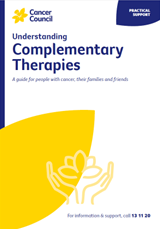- Home
- About Cancer
- Living well
- Complementary therapies
- Individual therapies
- Western herbal medicine
Western herbal medicine
What is it?
Western herbal medicines are usually made from herbs traditionally grown in Europe and North America, but some come from Asia.
Why use it
Herbal medicines are often used to help with the side effects of conventional cancer treatments, such as reducing fatigue and improving wellbeing. Evidence shows they should only be used in addition to conventional therapies, rather than as an alternative.
What to expect
After taking a case history, the practitioner puts together a holistic picture of your health. They will look for underlying reasons for your ill health or symptoms, and provide a herbal mixture aimed at addressing the causes and symptoms of your illness. They may give you a pre-made herbal formula or make up a blend of herbs specifically for your needs.
Herbal medicines can be prepared as liquid extracts taken with water or as a tea (infusion), or as creams or tablets and capsules.
What is the evidence?
There is a wide body of research into the effectiveness and safety of many herbs, and some studies show promising results. Speak to your doctor and herbal medicine practitioner about the potential side effects of any herbal preparations.
Using herbs is complex and it’s best to see an experienced practitioner rather than trying to treat yourself. Some herbs interact with conventional cancer treatment or medicines, and change how the treatment works or how the dose is absorbed. See some tips on using herbs safely.
Meditation and Relaxation Podcast
Listen to more of our meditation and relaxation podcast for people affected by cancer
More resources
Dr David Joske, Clinical Haematologist, Sir Charles Gairdner Hospital and PathWest, Chairman and Founder Solaris Cancer Care Foundation, Clinical Professor of Medicine, The University of Western Australia, WA; Australasian Integrative Medicine Association (AIMA); Dr Robert Blum, Clinical Director, Cancer Services, Bendigo Health, NSW; Sally Brooks, Senior Pharmacist, Medicines Information, Peter MacCallum Cancer Centre, VIC; Dr Suzanne Grant, Senior Research Fellow, NICM Health Research Institute, Western Sydney University, and Chris O’Brien Lifehouse, NSW; Prof Danforn Lim, Adjunct Professor and Advisory Board Member, NICM Health Research Institute, Western Sydney University, and Adjunct Professor, UTS, NSW; Christina Line, Statewide Services Senior Coordinator, Cancer Council WA; Jen McKenzie, Physiotherapist (Lymphoedema) and ESSA Accredited Exercise Physiologist, The McKenzie Clinic, QLD; Simone Noelker, Wellness Centre and Pastoral Care Manager, Ballarat Regional Integrated Cancer Centre, VIC; Dr Nirzari Pandit, General Practitioner, RACGP Specific Interests Integrative Medicine Group, NSW; Georgie Pearson, Consumer; Cris Pirone, Counsellor, Cancer Council SA; Dr Elysia Thornton-Benko, Specialist General Practitioner, and UNSW Research Fellow, NSW; Kirsty Trebilcock, 13 11 20 Consultant, Cancer Council SA.
View the Cancer Council NSW editorial policy.
View all publications or call 13 11 20 for free printed copies.
Need to talk?
Support services
Coping with cancer?
Speak to a health professional or to someone who has been there, or find a support group or forum
Looking for transport, accommodation or home help?
Practical advice and support during and after treatment
Cancer information
Dealing with the diagnosis
Common reactions to a cancer diagnosis and how to find hope
Explore our resource hub
Explore and download our booklets, fact sheets, podcasts, webinars and videos for people affected by cancer

